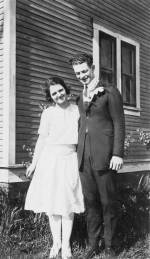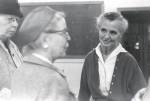|
Ava Helen Pauling, more than any other person, was responsible for Linus Pauling’s peace work. Raised
on a farm in Oregon, the tenth of twelve children born to a socialist schoolteacher
father and suffragist mother, Ava Helen learned early in life that issues of social
justice were paramount -- and that women could do anything. She was a bright girl
who breezed through high school in three years, and met her future husband while taking
a chemistry class from him at Oregon Agricultural College. The teacher fell in love
with the student, the student with the teacher, and they were married in 1923, just
after he entered graduate school in chemistry at the California Institute of Technology.
Pauling quickly discovered that his new wife was an extraordinarily able woman. Soon
after they were married, he brought home a book on intelligence tests. They worked
the problems together. "Much to my astonishment," he remembered, "I found that my
newly acquired wife could work these mathematical problems faster than I could, and
get the right answer more often than I could." She helped him with his early laboratory
work, accompanied him while he studied physics in Europe, spurred him to achieve great
things, and tried to infuse him with some of the left-leaning social idealism to which
she was herself committed. Dinner-table discussions through the 1930s and 1940s often
centered on political issues. Before marriage, Pauling had voted Republican. Not long
after, he was voting for liberal Democrats. Ava Helen encouraged him to support world
government, to vote for Franklin D. Roosevelt, and to give a young Japanese-American
man a weekend job as a gardener. Under her influence, Pauling’s political views took
a decidedly liberal bent.
|
|
Click images to enlarge

Ava Helen Miller and Linus Pauling, Oregon Agricultural College Graduation Day, Corvallis,
Oregon. 1922.

Ava Helen Pauling. 1950s.
"Ava Helen had been interested in social, political and economic problems ever since
she was a teenage girl. She used to argue with a friend of the family, one of the
judges of the Oregon State Supreme Court. She had a general interest in science and
was very able, very smart, but she was really concerned about human beings. The humanistic
concern she had was very great. I'm sure that if I had not married her, I would not
have had this aspect of my career -- working for world peace."
|

